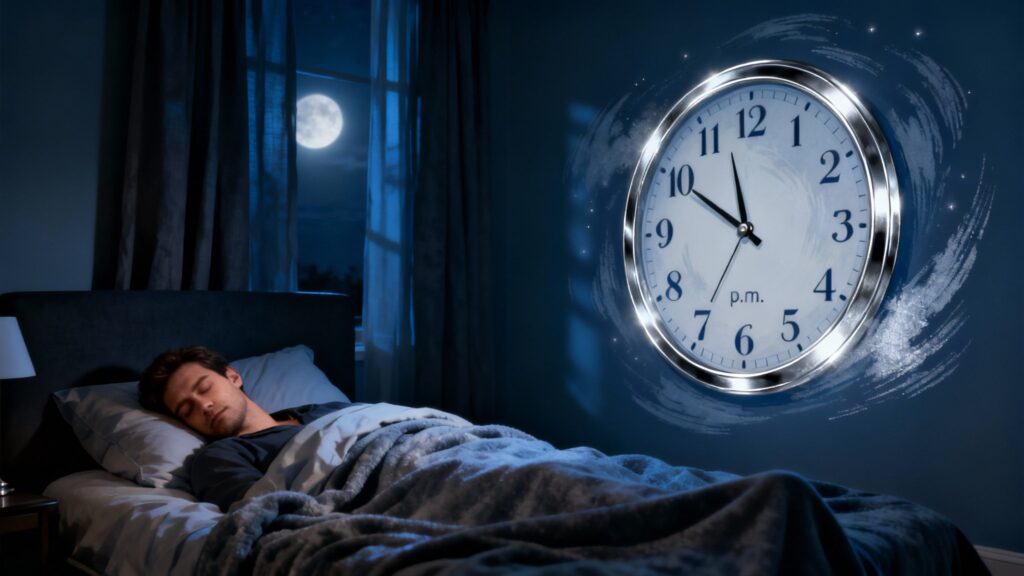Sleep Health by Habit: Your Complete Guide to Better Rest Through Daily Routines
Key Takeaways
- Sticking to the same sleep schedule trains your body’s internal clock
- Drink your caffeine early and avoid it starting 2 PM make your room dark—these two things alone can transform your sleep
- Most adults need 7-8 hours, but quality matters more than just hitting a number
- New sleep habits take about two months to feel automatic
- Morning sunlight and a simple bedtime routine create compound benefits over time
I used to roll my eyes at people with bedtime routines. Candles? Herbal tea? A whole pre-sleep ceremony? Who needs a production just to close their eyes?
Turns out… me. I needed it. I was limping along on four hours of sleep and way too much coffee, wondering why every day felt uphill in wet cement. Spoiler: it wasn’t that life got harder. It’s that I was trying to run it on a dead battery.
Sleep health by habit just means building routines that help you sleep better. When I finally got this—after years of feeling like garbage—everything changed. Not in some dramatic before-and-after way, but in a “holy crap, I forgot what having actual energy feels like” way.
The CDC says over a third of American adults don’t get enough sleep. When you think about how we live—phones always on, coffee at weird hours, stress through the roof—it’s honestly shocking any of us sleep at all.
But here’s what I figured out after years of trying different things: most sleep problems aren’t medical mysteries. They’re just bad habits. Which is actually good news because habits can be fixed.
The difference between waking up ready to go versus feeling like you got hit by a truck? Usually comes down to small, boring, consistent choices. Not supplements. Not a fancy mattress. Just habits.
What This Actually Means
When I talk about sleep health by habit, I mean something simple: build routines that work with your body instead of against it.
Your brain loves patterns. It’s always looking for them. When you do the same things before bed every night, your brain eventually gets it. “Oh, lights are dimming and we’re reading? Time to make some melatonin.”
It’s like training a dog. A really smart, stubborn dog that lives in your head.
The National Sleep Foundation found that people with consistent sleep habits get better quality sleep. Your brain treats these repeated behaviors as signals. Falling asleep gets easier over time instead of being a nightly fight.
What Bad Sleep Actually Does to You
Sleep deprivation wrecks your mood, and I mean “really wrecks it.” Everything around you just feels more annoying when you’re tired and even the slightest mistake just fuels your temper (you might even get hired on the spot to replace Anger in Inside Out). That’s not you being unreasonable—it’s your brain’s emotional brakes running on empty.
Your memory gets foggy. You walk into rooms and forget why. Your immune system weakens. There’s this one study in the journal Sleep and they found out that people sleeping under seven hours are three times more likely to catch a cold (Oh that virus just gets you knocked down for days). Why? Because your body needs sleep to fight off basic stuff.
Most of us think this is normal. “I’m not a morning person.” “Mondays are always rough.” “Coffee is my personality.” But what if you’re just chronically tired and forgot what feeling good actually feels like?
How Habits Actually Work
Ever heard of the habit loop?Remember these three:cue, routine, reward. Once you get this, you can use it instead of accidentally training yourself to scroll until 2 AM.
Example: Dim the lights at 9 PM (cue), read for 20 minutes (routine), feel drowsy (reward). Do this enough and your brain makes a shortcut. Dim lights plus book equals sleepy time.
You’re not fighting your body. You’re working with it. That’s why some habits stick and others die by January 3rd.
Why This Works
Your brain has this tiny region called the suprachiasmatic nucleus. It’s your body’s master clock and it’s obsessed with schedules. It uses light and darkness to coordinate your sleep-wake cycle.
Consistent habits train this clock to work better. Inconsistent habits—bed at 10 PM Tuesday, 2 AM Friday—create chaos. Like an orchestra where everyone’s playing different songs.
The Truth About Building Habits
You’ve heard it takes 21 days to form a habit. That’s not true. That number came from a plastic surgeon in the 1960s who noticed patients took about 21 days to adjust to their new faces. Interesting, but not science.
Real research from University College London found habit formation takes 21 to 66 days. Average is 66 days for something to become automatic.
The good part? Missing a day or two doesn’t ruin your progress. You need consistent repetition, not perfection. You don’t have to be a robot.
Sleep Affects Everything

Regular sleep schedules help control blood pressure. Research in Hypertension shows people with consistent bedtimes have way lower rates of high blood pressure.
Sleep also regulates leptin and ghrelin—hormones that control hunger. When you’re sleep-deprived, ghrelin spikes and leptin drops. Your hunger signals get scrambled. That’s why you need an entire pizza at 11 PM after a bad night. It’s not weakness. It’s hormones.
Your Brain’s Cleaning System
This blew my mind: your brain has a waste-clearance system called the glymphatic system that mostly works during sleep. University of Rochester researchers discovered this recently.
While you’re asleep, your brain flushes out toxins and waste. It’s like a nighttime cleaning crew. When you prioritize sleep health by habit, you give them time to finish. That’s why people who sleep well feel sharper and handle stress better. Their brains actually get maintained instead of accumulating junk.
Habits That Actually Work
Let’s get practical. These are organized by category because changing everything at once means changing nothing.
Timing and Schedule
The foundation is consistent timing. Within 30 minutes, every day, including weekends.
I know. This is where people get mad at me. But it works.
Same bedtime and wake time synchronizes your circadian rhythm and this makes falling asleep feel natural instead of forced. Most adults need to get a 7-8 hours of sleep while teenagers need 9-10 because their brains are still developing and their rhythms shift later during puberty.
Sleep tracking can help. Fitness watches, apps, whatever. Just don’t get anxious about your sleep score. Use the data as a guide, not a report card.
The Weekend Thing
You need to keep your sleep schedule on weekends too. Within an hour of weekday times.
I know. Sleeping in Saturday morning is one of life’s pleasures. But shifting your sleep times dramatically on days off creates “social jet lag.” Your body gets confused and Monday feels even worse.
If you need to adjust your schedule, do it gradually. Fifteen minutes earlier each night. Let your body adapt naturally instead of shocking it.
Make Your Bedroom Dark and Cool
You don’t need a spa makeover or a mattress that costs more than your car. Just dial in a few basics.
- Temperature: Try to aim for 65–68°F (18–20°C). It might feel a bit weird at first, as if your room just turned into a walk-in freezer, but trust me, you will sleep better. It is because our body sleeps best when it cools down.
- Darkness: Light is sneaky. Even a sliver from a streetlamp can mess with melatonin. Blackout curtains or a solid sleep mask? Either of these two can be a total game-changer. When I moved into my apartment, the streetlight was unfortunately parked right outside my window and I just find myself waking up at 3 AM for weeks. Imagine that! What I did eventually? Bought blackout curtains. Instant fix. I was this close to sending them a thank-you card.
- Noise: Your brain loves turning every creak into a conspiracy at 1:47 AM. Cut the noise — earplugs or white noise can shut down that spiral. I keep a fan running year-round, not for the breeze, but for the steady hum that tells my brain, “Nothing to see here. Go to sleep.”
- Mattress and pillows: No need to overthink it, just don’t hang on forever. Mattresses usually last 7–10 years. Pillows? Swap every 1–2. And no, flipping to the “cool side” isn’t a strategy. Your neck will file a formal complaint.
Wind-Down Routine (a tiny ritual that tells your brain “we’re landing the plane”)
Start easing off 60–90 minutes before bed. Think dimmer lights, fewer tabs open—in your browser and your brain.
- Warm bath or shower: Low effort, high payoff. When you step out and your skin cools, it mimics your body’s natural pre-sleep temperature drop. Translation: you fall asleep faster—often 10–15 minutes faster. It’s like a sneak preview for your nervous system.
- Read a real book for 15–30 minutes: Paper, not a glowing rectangle. It’s calming, helps your brain file the day, and skips the blue light that messes with melatonin. Pick something interesting-but-gentle. I made the mistake of reading a thriller in bed once. Spent the night convinced my ficus was an intruder.
- Breathe like you mean it: If stress follows you to bed, try slow breathing or a quick body scan. I used to roll my eyes at breathing exercises too. Then I actually tried them. Turns out your nervous system is very coachable: long, slow exhales = “we’re safe, you can power down now.”
Lifestyle Stuff That Matters
Exercise
Regular exercise massively improves sleep. Getting 150 minutes of moderate exercise weekly can improve sleep efficiency by up to 65%, according to research in Mental Health and Physical Activity.
But timing matters. Hard exercise within 4 hours of bedtime is too stimulating. Your temperature and heart rate go up when they should go down.
Morning or afternoon workouts are your sleep’s best friend — they sync your body clock and build that good kind of tired. At night, go easy: gentle stretching or a mellow yoga flow is perfect. Just don’t chase a deadlift PR at 9 PM and then wonder why your brain is doing cartwheels at midnight.
Even a 10-minute walk after dinner helps. Light movement aids digestion and gets you away from screens.
Caffeine
Caffeine has a 6-hour half-life. Coffee at 4 PM means half that caffeine remains in your system at 10 PM. It blocks adenosine receptors—adenosine makes you feel sleepy. You’re telling your brain “not tired yet!” when your body needs rest.

Cut caffeine after 2 PM. I know this hurts. I went through all five stages of grief. But it makes a real difference.
Alcohol
Alcohol makes you drowsy initially. That’s why a nightcap seems smart. But it destroys your sleep quality. Reduces deep sleep and REM sleep. You might fall asleep faster, but the sleep is terrible.
If you drink, limit it to one drink at least 4-6 hours before bed.
Food Timing
Don’t eat huge meals within 3 hours of bedtime. Your digestive system needs to wind down too. But going to bed hungry also disrupts sleep. If you need a snack, keep it light. Small handful of nuts, chamomile tea, or a bit of turkey.
Light Exposure
This is one of the most powerful tools and most people ignore it.
Get 15-30 minutes of morning sunlight within 2 hours of waking. This sets your circadian rhythm. Stanford neuroscientist Andrew Huberman has done tons of research on this. Morning light is one of the most effective ways to improve sleep. And it’s free.
In winter or with limited light, use a 10,000-lux light therapy lamp for 20-30 minutes in the morning. I started this during a dark winter. The difference was huge. Went from hibernating bear to actually having morning energy.
Dim your lights gradually starting about 2 hours before bed. Softer, warmer lighting helps melatonin production.
Blue light from screens is bad after 8 PM. Use blue light glasses, adjust device settings, or just avoid screens during wind-down. I know that’s asking a lot. But your sleep will genuinely improve.
Advanced Stuff
Napping
Naps can be awesome — when you play by the rules. Keep them short (20–30 minutes max) and avoid napping after 3 PM. That quick reset boosts alertness and mood without hijacking your nighttime sleep. Think of it as a power-up, not a second bedtime.
Not talking about passing out on the couch for three hours Sunday afternoon and then lying awake until 2 AM. Not that I’ve done that. Multiple times.
Personalize Your Setup
Side sleepers need thicker pillows. Stomach sleepers need thinner ones. Back sleepers are in between. Mattress firmness should support your spine based on body weight and position.
I woke up with neck pain for years before figuring out I was using the wrong pillow height for side sleeping. Changed my pillow, problem solved. Felt like an idiot.
Seasonal Changes
Sleep needs shift with seasons. Winter might need earlier light therapy and longer wind-down periods. Summer might mean earlier bedtimes and extra cooling.
When traveling, keep familiar bedtime rituals. Gradually adjust your schedule before crossing time zones. Stay hydrated. Bringing your own pillow might seem excessive, but if it helps? Not excessive.
Common Mistakes
Using Your Bedroom for Everything
Your bedroom should be for sleep and sex. That’s it. Not working. Not eating. Not Netflix. Not scrolling your phone for hours.
Your brain makes associations. Work in bed regularly and your brain associates bed with work stress. Then when you try to sleep, your brain’s confused. “Aren’t we supposed to be panicking about deadlines?”
Checking the Time at 3 AM
Nothing good comes from checking the time when you wake up at night. You’ll just calculate how much sleep you’re losing and spiral into anxiety.
If you wake up, don’t look at clocks or phones. Practice relaxation instead. If you must have your phone nearby, turn it face-down.
Sleeping In on Weekends
You can’t catch up on sleep like catching up on a show. Sleeping in dramatically on weekends messes up your rhythm and makes Monday worse.
I know nobody wants to hear this. Sleeping in Saturday feels like a human right. But it’s sabotaging your sleep more than you think.
Ignoring Real Problems
If you’ve followed good sleep habits for 4-6 weeks and still struggle, talk to a doctor. Some problems need professional help. There’s no prize for toughing it out.
Making Habits Stick
You can’t reinvent your whole sleep life in a weekend. I’ve watched people try: new bedtime, new wake time, daily workouts, meditation, a full bedroom makeover, and a brand-new diet—all at once. It looks great for about three days… then burnout. Real talk: pick one or two changes, make them stick, then layer on the next. Small, steady wins beat the all-or-nothing sprint every time.
Start with 1-2 changes. Maybe consistent bedtime and morning light. Get those solid before adding more. You’re building a foundation, not the whole house in one weekend.
Track Without Obsessing
Keep a simple sleep journal or use an app. This helps you see patterns and what actually works.
But don’t get anxious about your data. I’ve seen people develop genuine anxiety about their sleep scores. “My REM was only 18% instead of 20%, am I dying?” You’re not dying. You’re overthinking.
Habit Stacking
Link new sleep habits to existing routines. Already brush your teeth every night? Add 5 minutes of reading right after. This makes the new habit feel natural. You’re building on something solid instead of starting from scratch.
Life Happens
You’ll have nights when your routine gets disrupted. When sleep doesn’t come despite your best efforts. When life throws curveballs. When your neighbor decides 11 PM is drum practice time.
That’s normal. That’s life.
What matters is getting back to your habits consistently, not being perfect every night. One bad night doesn’t erase progress. Just get back on track the next night.
When to Get Help
Sleep health by habit fixes many common issues, but sometimes you need more than habits. If you’ve followed good sleep hygiene for 4-6 weeks and still struggle consistently, see a doctor.
Sleep disorders like sleep apnea, restless leg syndrome, or chronic insomnia need specialized treatment. Sleep apnea signs include loud snoring, gasping during sleep, and feeling exhausted despite adequate sleep time. Restless leg syndrome causes uncomfortable leg sensations that worsen at night.
When you see a doctor, bring detailed information. Sleep patterns, daily habits, symptoms. A sleep diary covering 1-2 weeks helps. Be specific. “I sleep badly” is less helpful than “I fall asleep fine but wake at 3 AM every night and can’t fall back asleep for 2 hours.”
Don’t hesitate to get help. Sleep disorders are common and treatable when diagnosed properly. You wouldn’t feel bad about seeing a doctor for a broken arm. Your sleep is just as important.
Questions You Probably Have
How long until I see results?
Most people notice changes within 1-2 weeks. Falling asleep faster, more energy during the day. Significant improvements show up after 4-6 weeks as your body clock adjusts. Full habit formation and maximum benefits usually come after 2-3 months when behaviors become automatic.
Like going to the gym. You won’t see abs after one workout, but you’ll feel different quickly. Real changes come with consistency.
What about night shifts?
Shift work is harder. But you can still maintain good sleep health. The key is consistency—if you sleep 9 AM to 5 PM after work, keep similar hours on days off. I know that’s tough. Everyone’s awake during your sleep time. But consistency matters.
Blackout curtains are essential. Light therapy and melatonin (under medical guidance) can help. Takes more effort than regular schedules, but it’s doable.
I wake at 3 AM and can’t fall back asleep. Help?
Don’t check the time. Don’t grab your phone. Don’t turn on the TV. Practice relaxation—deep breathing, muscle relaxation—while staying in bed for up to 20 minutes.
Still awake? Get up and do something quiet in dim light. Reading works. Folding laundry works. What doesn’t work: scrolling social media, checking email, watching YouTube conspiracy videos.
Go back to bed only when you feel drowsy. The goal is keeping that strong association between bedroom and sleep, not lying there getting frustrated.
Do supplements work?
Melatonin can help short-term, especially for schedule adjustments or jet lag. Not a magic bullet, but it can help. Magnesium and chamomile might support relaxation, though effects are mild. Some people swear by them, others notice nothing.
Prescription sleep aids should be temporary while you build sustainable habits. They can create dependency and don’t fix underlying issues. Like using crutches for a broken leg. Helpful temporarily, but not forever.
Always talk to a doctor before starting supplements, especially if you take other medications.
How does age change things?
Sleep needs and patterns change throughout life. Teenagers genuinely need 9-10 hours and have later natural bedtimes due to puberty. This isn’t laziness—it’s biology. Fighting it is like fighting gravity.
Adults over 65 often wake earlier and have more fragmented sleep, making routines even more important. Pregnancy, menopause, chronic conditions—all require adjustments.
Core principles stay the same (consistency, good environment, healthy habits), but specific applications might need tweaking based on life stage.
Bottom Line
Improving your sleep health by habit isn’t about perfection. It’s about consistency. Working with your biology instead of fighting it.
Small changes you make today—same bedtime, morning sunlight, earlier caffeine cutoff, wind-down routine—they compound. They build on each other. Over time, they create real improvements in how you sleep and feel.
I’ve seen this work for tons of people. I’ve experienced it myself. Better sleep doesn’t need expensive gadgets or complicated protocols or secret hacks influencers sell for $97. It needs understanding how your body works and building habits that support your natural rhythms.
Start small. Pick one or two habits from this guide. Commit for a month. Track what happens. Adjust as needed. Be patient. Every night is a new chance to practice these habits and move toward the restorative sleep your body needs.
Your future well-rested self will thank you for starting today.
Now if you’ll excuse me, it’s getting close to my bedtime and I have a routine to follow. Because I practice what I preach. Most of the time. Like 80% of the time, which is honestly pretty good.








One Comment
Comments are closed.